Quickhits
Soneva celebrates 20 years of sustainable leadership

Soneva celebrates 20 years of sustainable leadership with Sustainability Report 2015-16
- Soneva’s sustainability initiatives valued at USD 34.2 million
- Soneva is carbon neutral including guest air travel and import of products
- 73% of solid waste is recycled, generating USD 265,249 in cost savings
- 12,000 glass bottles recycled into art and tableware at Soneva’s Glass Studio
- USD 6.2 million raised through Soneva’s Environmental Levy to-date
- 1.2 million plastic bottles prevented from going to landfill since 200
Soneva, has released its Sustainability Report 2015-16, which celebrates 20 years of sustainable operations since the company was founded in 1995.
Last year Soneva pioneered the global hospitality industry by publishing the first ever Total Impact Assessment (TIA) tool, which was developed in-house. The TIA measures the impact of a company’s operations in five categories – Natural Capital, Human Capital, Social Capital, Economic Capital and Tax – and allows the company to quantify and monetise these impacts in a language that translates to standard business performance metrics. The result in 2015-16 showed that Soneva contributed a net positive impact of USD 34.2 million.
“Soneva is built on the foundation that a business must exist for a greater purpose than shareholder returns. We strive to set the benchmark for responsible tourism and we are strong advocates of the overall positive impact of travel and tourism, and the key role it plays in conservation,” said Sonu Shivdasani, Founder and CEO of Soneva.
“Our aim is simple – to make a difference wherever we can. We strive to provide a blueprint for the hospitality industry. We innovate to reduce our own emissions and costs and prove to our peers that this is possible. We strive to be the best employer, and own and operate the world’s best resorts. And, above all, we hope that the natural beauty of our resorts inspires our guests to embrace environmental stewardship,” he added.
Soneva’s Sustainable Initiatives
Waste: Soneva demonstrates that waste does not have be a problem, but can be an asset. Through its innovative Eco Centro Waste-to-Wealth concept, Soneva recycles 73% of solid waste and 100% of food waste across all resorts and generated USD 265,249 in value in 2015-16. Furthermore, the Glass Studio at Soneva Fushi in the Maldives turned 12,000 waste bottles from both the resort and neighbouring resorts into useful glassware as well as objects of art, as well as providing a uniquely fun guest experience.
Environmental Levy: Early on, Soneva recognised that due to its resorts being in remote areas, guest air travel would have a significant environmental impact. In 2008 Soneva introduced an Environmental Levy for all guests, which is an additional 2% charge that is invested in projects that have a positive environmental, social and economic impact and importantly, offset carbon emissions from resort activities and guest flights. To-date, this Environmental Levy has raised USD 6.2 million. Through the Soneva Foundation, the funds have been invested in carbon mitigating projects like reforestation projects in Asia and the Myanmar Stoves Campaign, which have mitigated 388,599 tonnes CO2 to-date. In addition to making Soneva carbon neutral (including guest air travel), projects like the Myanmar Stoves Campaign have generated USD 9.4 million in social value over the last three years, and 186,018 people have benefited from fuel efficient stoves in Myanmar and Darfur alone.
WHOLE WORLD WATER: Furthermore, Soneva has prevented approximately 1.2 million plastic bottles from going to landfill since 2008 when the company banned all imported water and produced its own filtered and mineralized drinking water on-site in reusable glass bottles. The savings achieved from this were invested in the Soneva Foundation and WHOLE WORLD WATER to give 752,345 people access to safe drinking water and basic sanitation.
“To solve the social problems of the 21st century, companies need to play an important part. They can do this by making small tweaks to their business models that do not detract from their customer’s perception of the business nor negatively impact on the business’s profitability; but, which can raise considerable capital for good causes,” added Arnfinn Oines, Soneva’s Social and Environmental Conscience.
The sustainability report also details initiatives and partnerships aimed at creating wider social and environmental change. Collaboration with organisations such as World Travel and Tourism Council, International Tourism Partnership, The Long Run and NGO partners are on-going, and Soneva fosters global connections among experts through its annual SLOW LIFE Symposium.
Soneva’s other sustainability initiatives include:
- The annual Learn to Swim Programme in the Maldives
- Children’s cooking competitions
- Junior Host Programmes
- Female recruitment and empowerment initiatives
- Local community engagement programmes
- Mobile dog clinics
- Other Soneva Foundation Projects
These initiatives, among others, supported Soneva’s efforts in winning the World Travel & Tourism Council’s Tourism for Tomorrow Award for the second time in 2015, cementing the company’s place as the leading sustainability champion in the hospitality industry.
Please click the link to read Soneva’s 2014-15 Sustainability Report in full.
Soneva owns and operates Soneva Fushi and Soneva Jani in the Maldives and Soneva Kiri in Thailand. Soneva in Aqua, an ultra-luxurious yacht, was launched in the Maldives in 2015 and sails out of Soneva Fushi. For more information about Soneva visit www.soneva.com
Action
Banyan Tree Marine Lab: Home of conservation in Maldives for 19 years

The inauguration of the Banyan Tree Marine Lab in 2004 marked a significant milestone as the first resort-based establishment in the Maldives dedicated to safeguard the natural environment and marine ecosystem.
Operating under the guiding philosophy of conservation, restoration, education, and research while catering to both Banyan Tree Vabbinfaru and Dhawa Ihuru, formerly known as Angsana Ihuru, the pioneering Marine Lab has been instrumental in supporting essential fieldwork carried out by visiting experts.
Over time, the Marine Lab has expanded its role to become a leading advocate for sustainability initiatives conducted by both resorts, such as spreading awareness about marine conservation in local schools and nearby communities.
Marine Talk
The primary objective of the Marine Lab is to enlighten guests about the indigenous marine ecosystems. Through a weekly schedule of Marine Talk, lasting for 20-30 minutes, guests are educated on topics such as coral reefs, the current challenges they confront and proactive measures to safeguard them.
Citizen Science
Twice weekly, snorkelling sessions with the resident marine biologists are conducted to document various species and monitor local populations residing in the house reefs.
Within this process, the team meticulously record three distinct categories of marine life: megafauna, groupers, and butterflyfish. These encompass an array of captivating creatures, including reef sharks, nurse sharks, eagle rays, turtles, trevallys, peacock groupers, crown of thorns starfish, and racoon butterflyfish.
The presence and abundance of megafauna populations play a pivotal role as indicators of the overall marine ecosystem’s health. They offer insights into prey availability, water quality, and the overall ecological integrity of the area.
Groupers, unfortunately, have faced considerable decline in population due to overfishing, primarily driven by their high value in fish markets. Nonetheless, they serve a vital ecological function by controlling the populations of herbivorous fishes, thus preventing overgrazing of corals, and promoting reef recovery.
Butterflyfish, known as ‘bioindicators,’ have a symbiotic relationship with coral reefs. By closely monitoring their populations, the team gain valuable understanding of the impact of coral bleaching, pollution, and habitat degradation on the health and vitality of the reefs.
Reef Cleanup
Ensuring the cleanliness of the reef is crucial to enhance the survival prospects of corals and protect the overall reef ecosystem.
Two predators are actively removed – the crown of thorns starfish (COTS) and the pincushion starfish (PINS), both notorious for consuming coral polyps, resulting in significant coral loss throughout the reef.
These species are referred to as ‘corallivores’ due to their primary diet consisting of corals. The crown of thorns starfish can devour up to 75 square feet of corals annually, far surpassing the rate at which we can grow and replant corals.
Coral Nursery
At the Marine Lab, one of the major initiatives revolves around coral restoration, aiming to breathe new life into the reefs.
The coral rope nurseries offer a promising solution for giving a second chance to coral fragments that break off from the main structures. These fragments, also known as coral recruits, are carefully collected, and affixed to rope nurseries, which typically span 10 metres in length and 2 metres in width.
Experienced divers staying at Banyan Tree Vabbinfaru and Dhawa Ihuru are invited to join the resident marine biologists in this meaningful endeavour.
Electric Reef
To enhance the preservation and restoration of local biodiversity and coral reefs, three electric reefs have been implemented and strategically positioned across both islands. This innovative approach fuses technology with ecology, yielding more efficient conservation outcomes.
An electric reef comprises a sizeable metal framework linked to a low voltage power source, generating a localised electronic field that facilitates increased calcium deposition on the metal surface.
The Banyan Tree Foundation pioneered the integration of this technology into the Maldives’ reefs with the construction of the Barnacle in 1996, way before the Marine Lab was built.
Subsequently, the Necklace and the Lotus were put together in 1998 and 2001, respectively, further extending the network of electric reefs to amplify our conservation efforts.
Over the past 19 years, the Banyan Tree Marine Lab has been a beacon of conservation and sustainability in the Maldives,” said Nicholas Hardman, Regional Marine Lab Manager. “We are incredibly proud of the progress we have made in coral planting, protecting house reefs, and promoting eco-friendly practices. Our commitment to fostering environmental awareness through educational activities remains steadfast as we continue to inspire positive change in our guests and the wider community.”
Banyan Tree Vabbinfaru is a luxury barefoot tropical paradise at the heart of North Male’ Atoll, 25-minute away from Velana International Airport via speedboat. With 48 pool villas dotting around the island, privacy and relaxation can easily be attained. Stay at least 3 nights and save up to 20% off the best available rate, which includes daily breakfast and dinner, plus complimentary speedboat transfers and sunset cruise. Find out more about this offer via Stay More Pay Less | Banyan Tree.
Situated approximately two-minute away via speedboat from Banyan Tree Vabbinfaru lies Dhawa Ihuru, a distinct island retreat of its own with 45 villas, and dubbed as “one of the best house reefs” and “diver’s paradise” in the Maldives. Discover Ihuru Island and gained flexibility with its villa and breakfast offer via Dhawa Ihuru Maldives | Dhawa Hotels.
Be in the know. Explore more about living a “sustainability culture” or download the Marine Lab Information and Activity Guide.
Featured
Time of togetherness: Embracing Ramadan in Maldives

As the ninth month of the Islamic lunar calendar approaches, Muslims worldwide prepare for the sacred period of Ramadan, a time of spiritual reflection, self-discipline, and community connection. In the Maldives, a nation of more than 1,000 islands scattered across the Indian Ocean, Ramadan is a unique celebration that brings families and communities together. Amidst a setting of crystal-clear waters and idyllic white-sand beaches, Maldivians honour their faith and embrace the spirit of togetherness during this special time.
The Maldives is a 100% Islamic nation. During Ramadan, Muslims in the Maldives and around the world fast from sunrise to sunset, refraining from consuming food and water during daylight hours. The fast is broken each evening with a meal called Iftar, traditionally starting with dates and water, followed by a diverse array of delicious dishes.
Traditionally, Iftar has been a family affair in the Maldives, with households coming together to prepare, cook, and enjoy the meal. It’s a time to reconnect and bond with loved ones, with the focus on sharing, gratitude, and humility. As Maldivians have embraced modernity, this family-oriented Iftar has evolved into a broader social gathering that sees extended families, friends, and neighbours coming together to share in the festive atmosphere.
In the capital city of Malé, you can find a unique blend of tradition and modernity during Ramadan. The bustling streets get even busier, as families gather in homes, communal spaces, or local restaurants. Restaurants and cafes offer special Iftar menus and buffets, catering to families and friends seeking to share their meal. In recent years, the Iftar scene in Malé has become more cosmopolitan, with international and fusion dishes being introduced to the mix.

As you venture beyond the capital, the spirit of togetherness remains strong on the inhabited islands. These communities, with their slower pace of life and deep-rooted traditions, offer an authentic glimpse into the Maldivian way of life. During Ramadan, islanders come together to share Iftar at local mosques, community centres, or simply by hosting friends and neighbours in their homes.
Ramadan in the Maldives is not just limited to the capital and inhabited islands. The nation’s luxury resort islands, renowned for their stunning beauty and world-class hospitality, also embrace the spirit of Ramadan. Though catering primarily to international guests, these resorts offer a unique opportunity for visitors to experience the local traditions of Ramadan, including Iftar.
Many resorts organise special Iftar events, where guests can break their fast with a variety of Maldivian and international dishes, set amidst a serene and picturesque backdrop. To further enhance the experience, some resorts offer educational sessions on the history and customs of Ramadan, providing guests with a deeper understanding of the holy month and its significance.
One key element of the Maldivian Ramadan experience that should not be missed is the Taraweeh prayer, which takes place after the Isha prayer each night. Both in the capital and on the inhabited islands, mosques fill with worshippers seeking spiritual solace and connection. Visitors to the Maldives are encouraged to witness this beautiful display of devotion and unity, as it serves as a testament to the strong sense of community that defines the Maldivian people.
In the Maldives, the enchanting archipelago renowned for its crystal-clear waters and pristine white-sand beaches, the sacred month of Ramadan takes on a unique and captivating charm. As devout Muslims across the nation partake in a month-long fast, the Maldivian culture comes alive with a deep sense of togetherness and spiritual rejuvenation. During this time, the true essence of Maldivian hospitality and warmth can be experienced in its purest form, as families, friends, and communities come together to break their fast.
The Maldivian Ramadan experience varies across the nation, with bustling Iftar gatherings in the capital city of Malé, to the tranquil and intimate family meals in smaller inhabited islands, and the luxury resorts offering their guests a taste of local traditions. Each corner of this breathtaking island paradise presents an opportunity to embrace the spirit of Ramadan and immerse oneself in the customs that define the Maldivian people. From the mouthwatering array of traditional cuisine to the serene Taraweeh prayers in local mosques, a journey through the Maldives during Ramadan is sure to leave visitors with an indelible memory of the nation’s rich culture and enduring devotion to their faith.
Featured
Meet Nasrulla & Priya: the ‘Island Couple’ at OBLU SELECT Lobigili

Nasrulla Mohamed and Priya Dubey, popularly known as the Island Couple, are a hospitality power duo at the adult-exclusive resort OBLU SELECT Lobigili, the Island of Love. Nasrulla Mohamed serves as the Island Chief – a role exclusive to OBLU SELECT Lobigili. His wife, Priya Dubey is the Front Office Supervisor. Married long before joining the resort’s pre-opening team, they leave no stone unturned in ensuring that guests have a memorable experience with every little detail taken care of.
Nasrulla Mohamed
Tell us a little about yourself, and how you started your career in hospitality.
Nasrulla: I was born in Ha. Dhidhoo, the northernmost atoll in the Maldives and I studied at the HA Atoll Education Centre. My growing-up years were different from the ones kids experience today: we had extra strong cultural influences and a unified community. Everyone was like family.
Upon finishing my education in 2000 and obtaining my London GCE O Levels, I gained valuable experience by working for renowned international hospitality brands. In 2004, I underwent training at the South African Butler Academy, specialising in butler services. Furthermore, I attended a course at the Australian Butler School in 2007 to further refine my skills. As a result of my dedication, I progressed from Junior Butler to Executive Head Butler by 2015.
My journey with AH&R began in 2015 when I joined the pre-opening team at OBLU NATURE Helengeli as an Assistant F&B Manager. Since then, I have worked at OBLU SELECT Sangeli, OZEN LIFE MADHOO, and for over a year I have been serving as the ‘Island Chief’ at OBLU SELECT Lobigili.
What does it mean to you to be an Island Chief?
Nasrulla: For me, it’s pretty simple: this island is my home, and I treat my guests like family. As the Island Chief and Island Couple, I’m all about making sure they have the best possible time here. It’s not just about guests. My team works very hard to make the magic happen, and I’m here to support them every step of the way. Because when we work together like a family, we can do anything.
Is the concept of ‘Island Chief’ connected to Maldivian culture, if yes, how?
Nasrulla: Yes, very much. Hospitality runs deep in our heritage, passed down from our ancestors. In Maldivian culture, the Island Chief is the leader of each island, and a women’s committee is also present to extend hospitality to important visitors, such as government officials and foreign delegates. They arrange warm welcomes, dining experiences, accommodations, and farewell ceremonies with great care.
What does a day at work look like for you?
Nasrulla: My day starts with a morning island round to ensure everything’s set for guests. I then join the operations meeting to address feedback, concerns, and solutions. We review the day’s highlights, including arrivals, events, and important movements. At breakfast, I interact with guests to gauge their satisfaction levels. I randomly inspect villas to prepare for guest arrivals and personally welcome guests, offering assistance throughout their stay. During the day, I assist colleagues in operational areas. In the evening, I check in with guests at the bar and restaurants. Lastly, I review the follow-up lists to ensure all issues are resolved and prepare for the next day.
Could you pick one element of Maldivian culture that you would most enjoy introducing to visitors?
Nasrulla: When it comes to the Maldives, it’s a true paradise of crystal-clear waters, pristine beaches, and azure skies. Personally, I often take pleasure in sharing my country’s stories and history with those who come to visit us.
Priya Dubey
Tell us a little about yourself, and how you started your career in hospitality.
Priya: I grew up in Bhopal, India. After completing my schooling, I pursued a course in Aviation, Hospitality and Travel Management at Frankfinn Training Institute. While I was pursuing my hospitality studies, I landed my first job as a Guest Service Associate at Radisson Blu. Apart from Radisson, I have also worked for ITC Hotels in Chennai before moving to the Maldives for work.
When did you join the AH&R family and what has been the experience so far?
Priya: I joined the pre-opening team of OZEN LIFE MAADHOO in 2016 as an F&B Attendant and worked at different F&B Outlets such as Tradition IndoCeylon and M6m, the underwater restaurant. When OBLU SELECT Sangeli was being launched, I got the opportunity to join the pre-opening team in a leadership capacity, as the F&B Captain at Simply Veg restaurant.
After a year, I was keen to work in the front office, and I got a role as the Guest Service Agent at the Front Office at OZEN LIFE MAADHOO. Working in F&B helped me a lot in handling guest relations, and I found that I have an intuitive knack for keeping guests happy.
Again, when OBLU SELECT Lobigili was being launched, I was able to join the pre-opening team as the Front Office Supervisor. I enjoyed rising to the challenge of setting up a new team.
What does a day at work look like for you?
Priya: The first thing to do in the morning is chart all the movements of the day. Followed by team briefing, attending all the arrivals and departures, and helping my team wherever they require assistance. Also, as the island couple, together with my husband, I meet all our guests to ensure they are having an amazing stay. Before I clock out, I prepare a plan for the next day’s operation.
What has been the highlight of your career to date?
Priya: The highlight of my career within AH&R is that I have been given the opportunity to join three pre-openings within the group which has taught me lots of skills and strengthened me as a person as well.
What motivates you the most?
Priya: It is the culture in AH&R, that we are like a family who takes care of everyone.
What is it like to be the island couple at OBLU SELECT Lobigili?
OBLU SELECT Lobigili is an adult’s exclusive island, and we host a lot of couples. When we introduce ourselves to the guests as the Island Couple, it is a very special feeling. Our guests usually become curious, interested and appreciate that Lobigili Island has everything curated for couples.
What advice would you give to young people looking to work in the industry, especially women?
It would have been rare to see a woman in a leading role a decade ago, but now women are running five-star properties. I must say the hospitality industry in Maldives offers plenty of opportunities for girls, and as a woman, I am very proud that here at OBLU SELECT Lobigili the majority of our team members are women – who are successfully handling all aspects of operations!
-
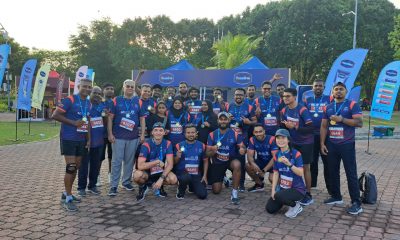
 Action1 week ago
Action1 week agoBestbuy Maldives supports health, wellness as Main Sponsor of MNU Marathon 2026
-
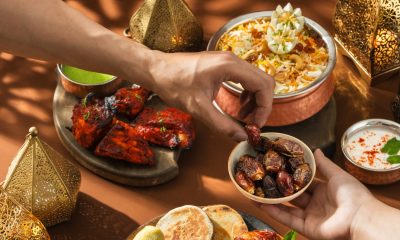
 Cooking1 week ago
Cooking1 week agoMaagiri Hotel invites guests to celebrate Ramadan with daily Iftar
-
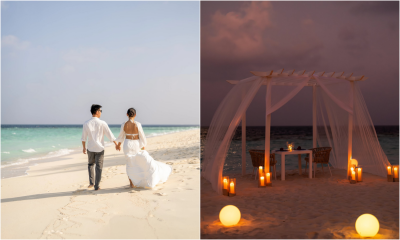
 Love1 week ago
Love1 week agoRomance in nature: Valentine’s week at Eri Maldives
-
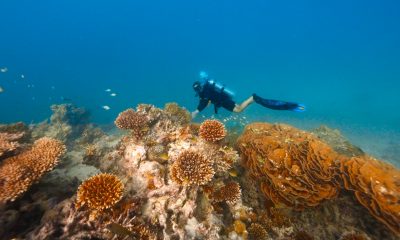
 News1 week ago
News1 week agoVentive Hospitality aligns Maldives portfolio with Green Fins marine sustainability platform
-
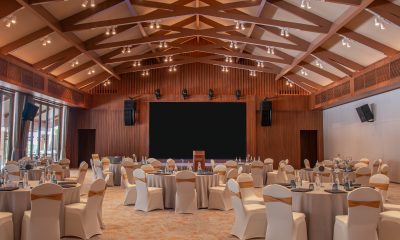
 Business1 week ago
Business1 week agoFeydhoo Hall opens at dusitD2 Feydhoo Maldives as new event space
-
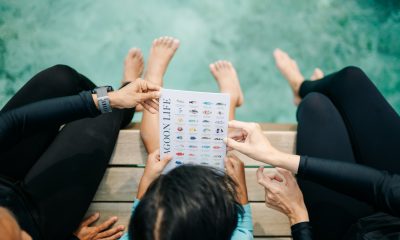
 News5 days ago
News5 days agoThe Ritz-Carlton Maldives, Fari Islands launches conservation programme for environmental observances
-
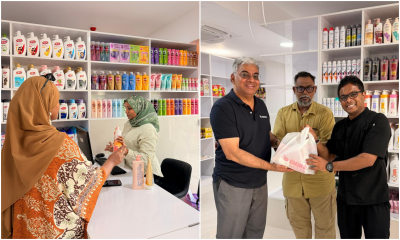
 Business1 week ago
Business1 week agoBBM expands retail presence with new Hulhumalé outlet
-
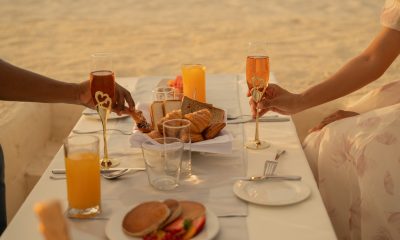
 Cooking1 week ago
Cooking1 week agoFrom shoreline to hotpot: New dining experiences at Sun Siyam Iru Veli



